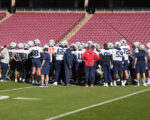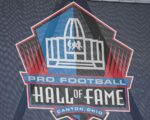AS THE FINAL SECONDS ticked away on the New York Knicks’ playoff thrashing of the Boston Celtics in May and the mad revelers of Bing Bong Nation poured out of Madison Square Garden, Justin Brandel sorted through a tangle of emotions. He was watching in amazement from his Manhattan apartment and trying to keep up with the text thread blowing up his phone — his friends, fellow Knicks fans, hazarding guesses about how much the cheapest tickets would cost for Game 1 of the Eastern Conference finals. $800 just to get in the door? $1,000? $1,500? Screw it, it’s worth it, his friends said. The last time the Garden hosted Game 1 of the Eastern Conference finals was 1994. There’s a real chance we’ll all be dead before this happens again. These are the Knicks, after all.
As friends began to commit, Brandel itched to join them. Money wasn’t the issue. He makes a good living as a personal injury lawyer in the city. His problem, however, is that he was legally forbidden from entering Madison Square Garden — banned by James Dolan, the CEO of MSG Sports and MSG Entertainment.
Ah, yes, that. Perhaps you’ve heard a thing or two about this banning habit of Dolan’s. Charles Oakley became the poster child for it in 2017, when Dolan slapped the Knicks legend with a ban from MSG after a physical altercation with Garden security during which Oak made several unkind remarks about Dolan. It flared up again in late 2022, when a New York Times article revealed that MSG Entertainment and Dolan now maintained a list mainly comprised of people who’d gotten in their legal crosshairs and were banned as a result, including some Knicks and Rangers season-ticket holders. Despite backlash, the list is still in effect, and according to reports, over a thousand lawyers across about 90 firms have been banned since 2022.
The vast majority of the names on MSG’s banned list belong to people like Justin Brandel: lawyers who are employed at a firm engaged in active litigation against MSG Entertainment’s properties, which also includes the Beacon Theatre and Radio City Music Hall in Manhattan, the Chicago Theatre, and the recently opened Sphere in Las Vegas. The list has drawn little media coverage outside of New York. But within the city’s legal community, it has become something of a local legend — the vengeful billionaire who deploys the most modern security technologies available, including facial recognition, to facilitate one of the oldest of human pursuits: settling scores.
Brandel, like everyone on the list, was banned from all of Dolan’s venues, not just MSG, and he’d already gotten a dose of the consequences. Earlier this year, his parents surprised him on his birthday with tickets for him and his wife to see two of his favorite comedians, John Oliver and Seth Meyers, at the Beacon Theatre. «I had to explain to them that I couldn’t go,» Brandel says, «because I didn’t want to give the MSG Company the satisfaction of kicking me out without any refunds. They ended up taking a couple that they’re friendly with.» Great seats, too. Orchestra level. «They’re not this nice usually,» he jokes. «It’s typical for my family that the one time they splurge, I can’t go.»
As luck would have it, the lawsuit that got Brandel and his partners banned was settled shortly after the NBA playoffs began in April. So, maybe he wasn’t banned anymore? How was he supposed to know? It’s not like the ban came with instructions from someone at the Garden about how it worked. «If I was sure I wasn’t going to get kicked out, I’d definitely explore the market — there’s still a 12-year-old kid in me that hates Reggie Miller,» he says.
«There’s absolutely no chance, though, that I’m spending $1,000 to even potentially be escorted out of MSG.»
Cooper Flagg handed Illinois the most lopsided defeat in the history of its men’s basketball program.
I share all this not just because it has crossed my mind more than once that this article could very well get me (and perhaps my editor — sorry, Justin) banned from Madison Square Garden, as well. I’ve tempted fate in the past — way back in 2011, during the lawless early days of Twitter, before we worried too much about things like digital footprints and facial recognition technology, I tweeted that Dolan was an «imbecile» for surrendering so many assets in the Carmelo Anthony deal (when they could’ve just signed him over the summer) and in 2013, I called him a «d—» for firing a Garden security guard who didn’t recognize him. Rude, I know, but I was also a pebble in an ocean of anti-Dolan agita. I never thought twice about it. (Dolan rehired the guard the next day.)
This is different. It occurred to me several times while Duke was stomping Illinois that this might be my last time in the building. And that thought sent me reeling through decades of memories and contemplating how my life would be different if someone erased them from my brain. No U2 after 9/11. No Michael Jordan in the flesh. No annual catch-ups with old Duke pals who came into the city just for the game. What’s being erased is nothing less than several of the peak moments of my life, when I felt most alive, when the emotions we typically experience in spoonfuls — joy, elation, catharsis, community — got turned up to arena-rock levels.
Nicolette Landi, a personal injury attorney with Harris Keenan & Goldfarb, was one of the original casualties of the policy back when news of it first reached the public. Landi loves Mariah Carey, so for Christmas, her husband bought her floor seats, $375 each on StubHub, for Carey’s annual holiday show at the Garden. It would be Landi’s first time seeing her queen. She didn’t know anything about a banned list. This was late 2022 — no one did. Plus, she says now, «I was at the Garden that October for a concert. I had no problem. I was there in November for a Knicks game — no problem.» Landi was nine months into her job at the firm, and at some point, between that Knicks game in November and the Mariah Carey show in December, she and all the other lawyers at Harris Keenan & Goldfarb got professional photos taken, which then got uploaded to the firm’s website.
Landi didn’t even make it through security at the Mariah Carey show. «As soon as my bag was going through the [conveyor] belt, there were 10 security guards around me,» she says. After she showed one of them her ID, he said into a radio, «Yeah, it’s her.» Her husband turned to her and said, «Oh my God, what did you do?» She had no clue. By happenstance, her father’s best friend is head of security at the Garden — he has helped her with tickets in the past — so she called him while they waited. «I saw them pull your name up,» he told her, but his hands were tied. «They won’t even let me come downstairs. They know I know you.» A few minutes later, she and her husband were out on the sidewalk. «I was like, ‘Well, what do we do now? I guess we just go home.’ I mean, it was like a Tuesday.» She bought a counterfeit Mariah Carey T-shirt outside «because I couldn’t get a real one. And then that was it.»
Her big night was over, but Landi’s private battle with Dolan was just beginning. The next year, she bought tickets to Mariah Carey’s Christmas show again, and this time, she snuck in by wearing a baseball cap and a COVID mask, and by strategically looking down as she went through security. («If you look up, you’re toast.») Landi says everyone at her firm defies the ban. «We’ve all snuck into the Garden here.» Two years later, her brother had tickets for a suite at a Rangers-Devils game at the Prudential Center in Newark, New Jersey, and during a trip to the bathroom, he spotted James Dolan, who’d come from another suite nearby and was watching his team in a road arena. «And my brother — he’s Italian, so he just had to open his mouth,» Landi says. He called Dolan an a–hole and blasted him for banning his sister. Dolan’s security followed him back to his suite and demanded his ID or they’d have him thrown out. The very next day, Landi says, her brother got a letter from MSG Entertainment’s general counsel informing him that he’d been banned from all of its properties, too, only his ban was «indefinite.»
This news filled him, his sister says, with a pride unlike any he has ever known.
IT ENDS THE SAME way it begins: with an official letter from the general counsel’s office at MSG Entertainment Corporation, sent via FedEx to every lawyer at the banished firm. «Dear Counsel,» it begins. «The litigation of which your firm represented one or more plaintiffs who were asserting claims against Madison Square Garden Entertainment Corp… has been resolved accordingly [and so] all attorneys employed at your firm may once again attend events at the company venues… We are happy to welcome you back and look forward to seeing you in the future.» MSG Entertainment is glad to take your hard-earned money again. No hard feelings!
It took a year in the wilderness for Joseph DePaola and his firm, but their letter «releasing us from our sentence» finally arrived in August 2023. «Pleasant letter,» he says. «Very nice.» (He still keeps a screenshot of the letter in his phone, just in case.) Brandel’s case has been resolved for months, but he’s still waiting for his letter. Unless he leaves Morgan & Morgan, though, the wait might never end for Dan Watts. That SueMSG.com website is like an open dare, and its existence all but guarantees the firm will always be suing MSG for something.
That goes for Seth Diamond, too, though at least the ban won’t dog him at all back in Savannah. And as unpleasant as the experience was, he views it as a learning opportunity for his 7-year-old son, a life lesson about money, power and decency. «Remember,» he told his boy afterward, «that the person who made this decision — they have more money than probably anyone you’ll ever meet in your life. But they’re doing things that aren’t good. And so what did we learn from this? It doesn’t matter if you have all the money in the world. What really matters is how you treat people.»
His son seemed to get it, he says. «I’m hoping it sticks.»







